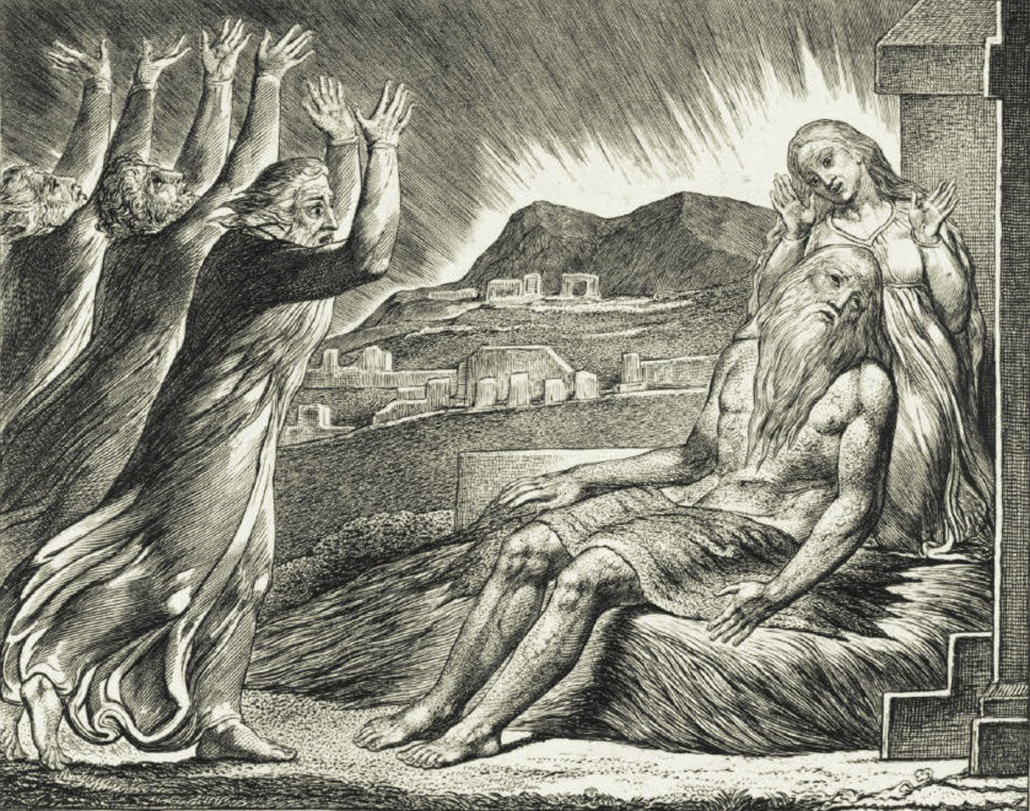Image: ‘Job’s Comforters’ by William Blake, 1825.
‘Let go the rope, pick up the thread’
Andrew Collis
Ordinary Sunday 28, Year B
Job 23:1-9; 16-17; Psalm 90; Mark 10:17-31
Prosperity doctrine or prosperity gospel means good news for the rich. Riches are regarded signs of divine approval, even blessing. Job is a rich man who becomes poor. In his suffering, he roundly rejects a prosperity gospel.
William Blake’s etching of Job, his wife and his friends (1825) tells the story. Job seeks a God of goodness/justice. His friends try to help but can’t help blaming Job, the victim. Their theologies are rigid, their images of God fixed in place.
Still, Job, with his wife, faces the difficulty, embraces even this opportunity for learning, for reimagining. In the name of justice, for goodness’ sake, Job speaks. He says he doesn’t know. He doesn’t know where God is, who or why.
To his friends, Eliphaz, Bildad and Zophar, this hardly seems theology at all. The final words of chapter 23 are remarkable: “I’m not silenced by the darkness nor by the deep gloom that covers my face.”
Blake was one who read the book as charting a course toward true faith. At book’s end, Job’s faith and speech (theo-poetics) are validated; his tormented passion for goodness/justice in contrast to the rational (prosperity gospel) theologies of those who would comfort him.
The movement (toward true faith) is seen in the gospel, too.
A person eager for life approaches Jesus and is challenged to let go dependence on familiar security, namely wealth and property, that a new freedom might be experienced.
There is a word of warning. Entitled or materialistic persons find it hard to make themselves sufficiently small for encounter with a God of little things.
There is humorous wordplay, too. The Greek word translated “camel” (κάμηλος) sounds like the word for “rope” (κάμιλος) – the pun works well in English too if we consider the words “camel” and “cable”. Some scholars suggest the rope or cable was made of camel hair!
The invitation, then, is to let go the cable of superiority … to give and to give away, to follow the way of Jesus, a certain intimacy – genuine love for others, especially victims of power and privilege, for neighbours in space and time.
Let go the rope of self-interest and pick up the thread of wisdom – the lifeline that connects … joins, holds, mends.
Let go the rope of colonial privilege; pick up the thread of covenant/treaty and advocacy.
Let go the rope of greed (or scarcity mindset); pick up the thread of cooperation, sustainability (faith in abundance).
Let go the rope of lazy convention; pick up the thread of living tradition.
Let go the rope of forceful intentions; pick up the thread of active listening.
The image connotes attentiveness – becoming single-minded with respect to goodness/justice.
We might imagine smaller appetites … narrower focus on goodness/fairness – the one before us who asks for justice … sharper awareness of climate crises and the urgent need for action, a more ethical and joyful future.
Unlike Job, the wealthy seeker of life in Mark’s gospel is unwilling to let go, and goes away downcast, a prisoner to both possessions and the conventions of prosperity doctrine.
Mark says that “Jesus looked at the person with love”.
Love lets go (forgives, confers freedom) that a chance might come again for the wealthy person, for the entitled, encumbered, foolish person (or people); in hope of goodness/justice, God’s kindom or commonwealth (an interwoven and interweaving world).
Pick up the thread, gossamer thin – it leads to new life with others. Amen.




